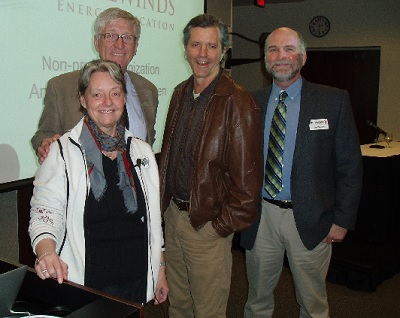Nuclear engineer Arnie Gundersen, a prominent voice in the US and international news media regarding the ongoing nuclear disaster at Fukushima, Japan, spoke in Chapel Hill November 20, 2013 in an event hosted by NC WARN.
Maggie Gundersen, a former nuclear industry PR spokeswoman, joined Arnie to provide an update on the ongoing challenges at Fukushima. They also discussed Fukushima’s safety and ratepayer ramifications for new nuclear plants proposed by Duke Energy. View the Gundersens’ talk here.
Epidemiologist Steve Wing of UNC-CH, who has studied radiation health effects for 25 years, discussed the impacts on the people living near Fukushima based on his visit in April 2013. View Dr. Wing’s talk here.
The Gundersens are authors of the best-selling Japanese-language book Fukushima Daiichi: The Truth and the Way Forward. See more on their work at www.Fairewinds.org.
Engineer Gundersen, a career nuclear power executive, served as an expert for NC WARN and allies in federal proceedings regarding flaws with the AP1000 reactor that Duke Energy is proposing to build.
More on the Fukushima-Duke Energy Connection:
Twin AP1000s are under construction in both South Carolina (VC Summer project) and Georgia (Vogtle project). Both projects are already suffering delays, millions in cost overruns and persistent, severe engineering challenges.
Still, Duke Energy is considering investing billions of dollars in the Summer project, a move challenged yesterday by NC WARN in an open letter to Duke CEO Lynn Good.
Also, Duke has invested $367 in “pre-licensing work” for twin AP1000 reactors at its Lee site in South Carolina but has not committed to beginning construction. That investment will be charged to ratepayers in both Carolinas (70 percent in NC) even if Duke never attempts construction, because utilities commissioners in both states deemed those pre-development dollars to be “prudent.”
NC WARN and allies sued federal regulators in 2012 to require upgrades to the AP1000 design based on the Fukushima accident. The US Nuclear Regulatory Commission’s Fukushima Task Force of “A-Team” experts urged such changes for all US reactors. The plaintiffs argued that design changes should be made before construction proceeded so that the upgrades would not be ignored and so that major redesign and rework during construction would not become a cash cow for contractors, with electric ratepayers being gouged by massive cost overruns. The US Court of Appeals sided with the industry/NRC earlier this year.






